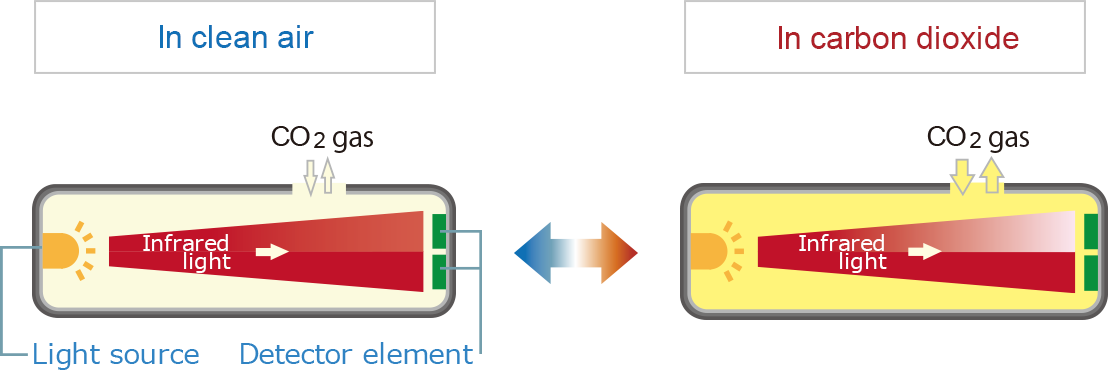Figaro offers a wide range of gas sensor products for the detection of various gases, from explosive gases such as propane, toxic gases such as carbon monoxide, to air quality sensors for volatile organic compounds (VOCs) that are responsible for sick-house syndrome. Figaro offers a diverse portfolio of sensor technologies that can be matched to the unique requirements of each application.
Structure of NDIR Gas Sensor
When infrared radiation interacts with gas molecules, infrared light is absorbed by the gas molecules at a particular wavelength, causing vibration of the gas molecules. NDIR (Non-Dispersive Infrared) gas sensors detect decrease in transmitted infrared light which is in proportion to gas concentration. This transmittance, the ratio of transmitted radiation energy to the incident energy, is dependent on target gas concentration.

NDIR gas sensor consist of an infrared source, detector, optical filter, gas cell, and electronics for signal processing. A single light source, dual wavelength type gas sensor has two detectors and two optical filters of different wavelengths which are placed in front of each detector. Infrared light that is absorbed by a target gas passes through the active filter with a particular bandwidth for the detection of the target gas. Infrared light that does not interact with the target gas passes through the reference filter. The difference between transmitted light intensities in these two bandwidths is converted into gas concentration. The dual wavelength sensor ensures stable measurements for a long period of operation as the aging effects of the light source or the gas cell are automatically compensated by output signals at the reference wavelength.
Operating Principle
Mid-infrared radiation through sample gas causes resonance of gas molecules at their natural frequency with the infrared light in the spectrum region where the energy level of infrared is equivalent to the natural frequency of gas molecules, resulting in absorption of infrared by gas molecules in the form of molecular vibration.
Relationship between infrared transmittance and gas concentration is expressed by the Lambert-Beer law:
\[ \huge{T=I/I_0=e^{-{\varepsilon}cd}} \]Where is transmittance, is the intensity of light passed through sample gas and optical filter, is the initial light intensity emitted from the source, εis the molar attenuation coefficient, is gas concentration, and is light path length.
Because εof target gas and the light pass length are fixed with an NDIR sensor, gas concentration can be measured by measuring the transmittance within the spectrum region of the absorbed energy (wavelength) by target gas.
The initial light intensity emitted from the light source is preset by calibration using zero gas which does not absorb infrared light. Initial value of the molar extinction coefficient ε is set by calibration using calibration gas of known concentration.
Features
Absorption of infrared light occurs at the IR energy (i.e. wavelength) specific to a target gas, meaning high selectivity to a specific gas. This is the most distinctive feature of NDIR gas sensors. Another feature is that exposure to high concentration of target gas for a prolonged time would not result in irreversible sensitivity drift in principle.

